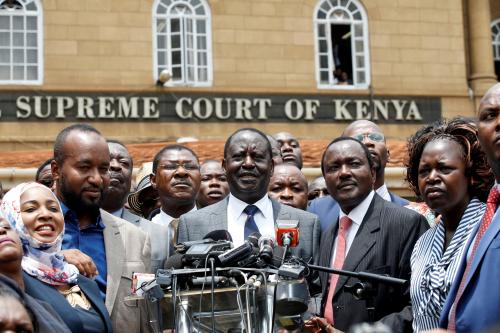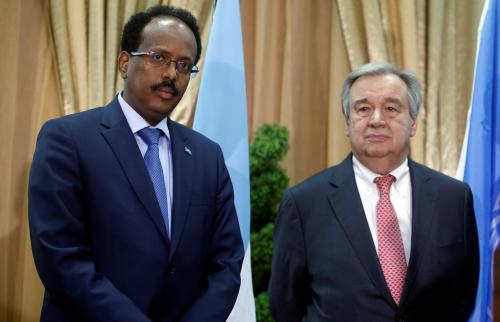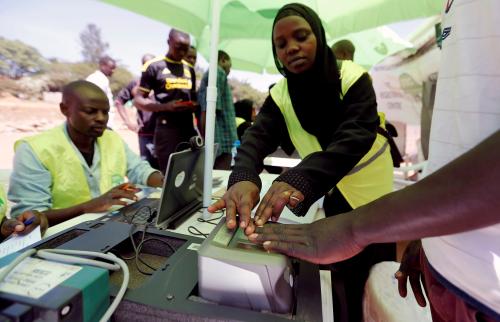Kenya’s election re-run sees low voter turnout and protests
On Thursday, Kenya held the re-run of its August 8 presidential election that was nullified in September due to election irregularities. The political air in Kenya has been tense for weeks, especially with main opposition challenger Raila Odinga’s boycott and continuing concerns over the legitimacy of the re-run. On Wednesday, a last-minute petition to delay the election was postponed due to a failure of the court to have a quorum. And, on Wednesday in his op-ed in the The Washington Post, incumbent President Uhuru Kenyatta said that Odinga and the opposition “seek to sow discord and delegitimize Kenya’s institutions and the vote on Thursday. They strive to force a path into power through a backroom deal in which they would hold office.”
Since Thursday, violence and protests have continued throughout the country, though largely in opposition-supporting areas. There have been reports of firebombing in Nairobi slums to which the police have responded with tear gas. Police have shot protesters. Some voters report attacks by opposition supporters for going in to vote. Five people have already been killed in the hostilities around the country.
Reports have stated that the October 26 election has been marked by low turnout, largely due to the boycott by Raila Odinga’s coalition, the National Super Alliance. As of Friday morning, turnout was estimated at only 34 percent—in comparison to August’s 80 percent. Quartz Africa reports polling stations reporting that “[n]ot a single voter voted,” stating that they could not open due to “an attack by hooligans,” or confirming extreme low turnout, but “free and fair.” In addition, voting in four counties has been postponed until Saturday due to “security concerns.” Other polling stations have reportedly been blocked off by opposition supporters.
Notably, given the low turnout, if Kenyatta does win, his mandate will be unclear. In addition, as Reuters reports, there are still many avenues through which opposition candidates can again call for an annulment. As George Kegoro, executive director of the Kenya Human Rights Commission, said, Thursday’s re-run “was more of a blow to democracy than it was a victory… It is a very, very significant legitimacy problem for whatever government [Kenyatta] might form.”
For up-to-date news on the election from the ground, see the Kenyan newspaper The Daily Nation.
Nikki Haley has strong words for South Sudan and DRC leaders, and Antonio Guterres calls for more international engagement in the CAR
This week, United States Ambassador to the United Nations Nikki Haley embarked on her first Africa trip where she paid a visit to South Sudan and the Democratic Republic of the Congo. Just before her departure, in an opinion piece on CNN.com, she stated that, during the visit, she would take a look at U.N. operations on the ground and meet with South Sudanese and Congolese leaders in order to “deliver a strong message that their governments need to stop making the work of aid workers and peacekeepers more difficult.”
Haley began her trip in South Sudan, during which she held a “very frank” conversation with President Salva Kiir, informing him that the U.S. had lost trust in the world’s youngest nation. She added that aid and other assistance are at stake and the U.S. will consider withholding funds if the violence does not ease. On Wednesday, she visited a U.N. camp, where her visit was cut short after hundreds of protesters showed up to protest Kiir, though the president was not present at the camp. Haley had to be escorted out of the camp.
Haley’s next stop was the Congo, a country with which she has continued to be forceful in her language against its government’s “predatory behavior.” She visited the Mungote camp in Kitchanga, home to 15,000 internally displaced people. She also met with the president of the electoral commission, emphasizing that the Congo must hold elections in 2018. She added that if delayed beyond 2018, the country would lose support from the international community.
In related news, U.N. Secretary General Antonio Guterres arrived in the Central African Republic, where he met with President Faustin-Archange Touadéra and other members of government. Guterres called for increased engagement from the international community in the country, as “there is an opportunity to build a new Central African Republic that is peaceful, secure and prosperous.” Guterres endorsed the need to strengthen MINUSCA—the peacekeeping United Nations Multidimensional Integrated Stabilization Mission in the Central African Republic—in order to allow it to better serve citizens. Guterres also warned against the potential use of religion to enforce political divisions, in light of the country’s historical division along ethno-religious lines. During his visit, Guterres also led a wreath-laying service to honor peacekeepers killed in action.
South Africa’s mid-term budget shows slow growth and tax challenges
On Wednesday, South African Finance Minister Malusi Gigaba presented the medium-term budget policy statement to its parliament, revealing that the National Treasury’s latest economic projections indicate slower than expected GDP growth for the economy and a severe budget deficit this year. Although an earlier estimate suggested GDP growth would reach 1.3 percent in 2017, this estimate was revised down to 0.7 percent due to large revenue deficiencies and the high costs of bailing out state-owned enterprises such as South African Airways and the post office. Meanwhile, tax revenues fell short by 51 billion rand ($3.7 billion dollars)—which the treasury called the “largest under-collection since the 2009 recession”—and is expected to produce a budget deficit of 4.3 percent of GDP in the 2017-2018 fiscal year. This would be the country’s largest budget deficit since 2009.
Following the budget presentation, the rand fell, and yields rose on the government’s benchmark 10-year local currency debt. Concerns of a credit rating downgrade are heightening due to the dismal budget outlook. Both S&P Global and Moody’s have credit rating reviews scheduled for November 24. If either firms cut their “local debt” ratings to junk status, South Africa’s $125 billion of rand-denominated debt will no longer be eligible for the world’s major bond indices, which would likely trigger selling and drive borrowing costs up for the country.
The Brookings Institution is committed to quality, independence, and impact.
We are supported by a diverse array of funders. In line with our values and policies, each Brookings publication represents the sole views of its author(s).








Commentary
Africa in the news: Kenya’s election re-run, Nikki Haley’s Africa trip, and South Africa’s budget troubles
October 27, 2017